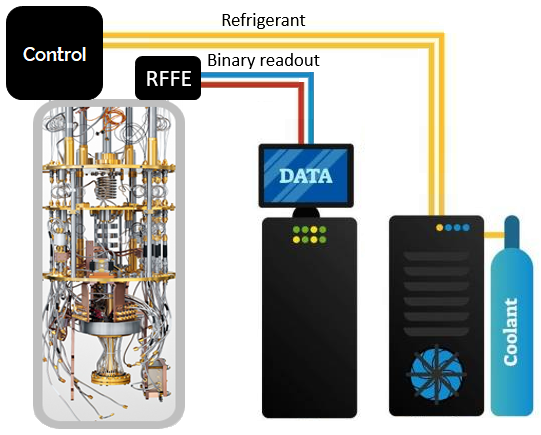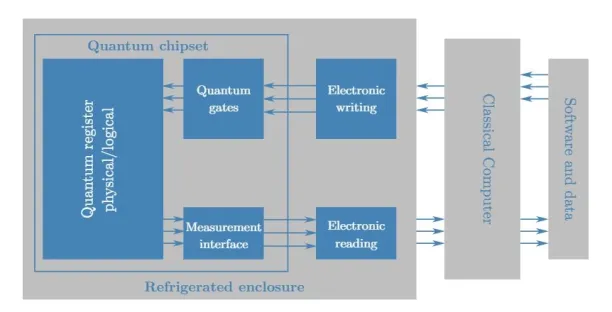The Quantum Leap: Unboxing the Components of a Quantum Computer
Introduction
In this digital era, our craving to process data faster and more efficiently has led us to the brink of a technological revolution: quantum computing. Combining the principles of quantum mechanics and computer science, quantum computers promise computational supremacy that traditional computers can only dream of. In this article, we will unbox the intriguing components of a quantum computer, explore how they operate, and vent into the potential challenges and prospects of the technology.
What is Quantum Computing?
Quantum computing, an avant-garde technology, provides a unique approach to information processing by leveraging distinctive aspects of quantum mechanics. Here's a glimpse into its key features:
• Utilizes Quantum Bits: Unlike classical computers that use binary bits (0 or 1), quantum computers are based on quantum bits, popularly known as qubits. Fascinatingly, qubits can exhibit both 0 and 1 states simultaneously due to a quantum property known as superposition.
• Exponential Computational Power: The capability of qubits to exist in multiple states contemporaneously allows quantum computers to perform calculations at a rate exponentially greater than traditional computers.
• Quantum Properties at Work: Quantum computing employs other quantum properties, like entanglement, where changes to one qubit can instantly influence another, regardless of distance, contributing to their superior computational prowess.
In essence, quantum computing sheds its own brilliant light on the realm of computing, providing new pathways for accelerated data processing and problem-solving.

What Are the Key Components of a Quantum Computer?
The enigmatic nature of quantum computing is carried by three pivotal components: qubits, superconducting circuits, and quantum logic gates. Each caters to a specific function, enabling the system to perform complex computational tasks in ways a classical computer simply can't.
Qubits: Pillars of Quantum Computing?
At the heart of quantum computing resides qubits - the quantum equivalent of classical bits. Unlike traditional binary bits, qubits take advantage of quantum properties like superposition and entanglement. A qubit can exist both as 0 and 1 simultaneously, a concept that drastically enhances the computational power of quantum machines. You can think of qubits as multi-dimensional bits that can hold an infinity of potential states until measured.
Superconducting Circuits: Facilitating Quantum Operations
The second vital component of a quantum computer is the superconducting circuit. Superconducting circuits are typically cooled down to temperatures colder than outer space - around -273.15 degrees Celsius - to ensure the stability and integrity of qubits. These circuits aid in the incredibly delicate control and manipulation of qubits, serving as a fundamental backbone in quantum operations.
Quantum Logic Gates: Orchestrating Quantum Computations
Similar to how classical computers use logic gates to execute operations on bits, quantum computers utilize quantum logic gates for performing operations on qubits. The twist, however, is in their complexity. A quantum gate operates in far more nuanced ways because of its interaction with qubits and their properties such as superposition and entanglement. Therefore, the gate's influence on qubits isn't as predictable as traditional logic gates, making computing inherently probabilistic.
In a nutshell, uncovering quantum computing involves understanding the synergistic cooperation of these complex components and how they leverage the peculiar principles of quantum mechanics. By doing so, we venture through the looking glass into a realm of computing that has the potential to redefine our understanding of processing power and data computation.
How Does Quantum Mechanics Theory Apply to Computing?
Quantum mechanics, the scientific theory that explains the behavior of matter and its interactions with energy on the scales of atoms and subatomic particles, plays a fundamental role in the world of quantum computing. Here, we delve into two key aspects - quantum superposition and quantum entanglement.
Understanding Quantum Superposition
- Quantum superposition is a fundamental principle of quantum mechanics which posits that any two (or more) quantum states can be added together ("superposed") and the result will be another valid quantum state.
- A qubit - being the quantum equivalent of a classical binary bit - relies heavily on this principle, by existing in both states '0' and '1' at the same time.
- The dynamism and unpredictability of qubits exponentially enhance the computational ability of a quantum computer, with a single qubit being able to hold an infinite amount of data due to superposition.
Quantum Entanglement: A Game-Changer
- Quantum entanglement is a quantum mechanical phenomenon where two or more particles become interconnected and the state of one directly influences the others, regardless of how far apart they are.
- This interconnectivity, a core principle of quantum computing, helps maintain high-speed communication between the qubits, resulting in a faster and more efficient processing output.
To summarize, quantum mechanics theories play a crucial role in quantum computing, giving it the edge over classical computing in terms of speed, efficiency, and dynamic data representation capabilities.
What Challenges Exist in Harnessing Quantum Computer Components?
Capitalising on the components of quantum computers is not without its tribulations. Obstacles emerge primarily in maintaining the integrity of the quantum state and efficiency of quantum processes. Among these, the most pronounced is 'Quantum Decoherence.'
Unravelling Quantum Decoherence and Its Influence on Quantum Computing
Quantum Decoherence is a fundamental challenge that tests the viability and reliability of quantum computers. But what is it, and how does it interfere with quantum computing?
- Definition: Quantum Decoherence is a phenomenon where qubits interacting with their environment lose their quantum properties. This results in qubits falling into a definite state, either 0 or 1, interrupting their superposition state.
- Impact on Quantum Computing: Quantum Decoherence impairs the effectiveness and potential benefits of quantum computers. It introduces errors leading to loss of information and disrupts the stability of the computing system.
- Example: Think of spinning a coin - while spinning, it's in a superposition state equivalent of being both heads and tails simultaneously. But on landing, it definitely turns into either heads or tails, similar to qubits experiencing decoherence.
- Mitigation Efforts: Quantum Decoherence is currently the most prominent obstacle to scaling up quantum computers. Addressing it involves isolating qubits from their environment to avoid disruption. Scientists and researchers are therefore persistently exploring innovative methods to decrease quantum decoherence to make quantum computers more practical and efficient.
In conclusion, despite the hurdles, research continues to leverage quantum mechanics' rich potential in the realm of quantum computing. However, overcoming challenges like quantum decoherence is paramount in realising the full potential of the quantum realm.
How Does the Future of Quantum Computing Look Like?
The prospective picture of quantum computing appears bright and holds immense potential. Despite the roadblocks, the technology's capacity to break through complex computational barriers could instigate a groundbreaking revolution across multiple sectors such as:

- Artificial Intelligence (AI): Quantum computers can process vast amounts of data and run intricate algorithms faster, accelerating the development and capabilities of AI.
- Cryptography: The power of quantum computers can potentially render current encryption techniques obsolete, paving the way for quantum cryptography and quantum key distribution.
- Drug Discovery: Quantum computing can simulate and analyze molecular structures more effectively, significantly boosting drug discovery processes.
To bolster this rapid progress, significant investments are being made in quantum computing. Consider these statistics:
- According to a report by Inside Quantum Technology, the quantum computing market could reach nearly $65 billion by 2030.
- Tech giants like IBM and Microsoft, alongside various start-ups, are heavily investing in quantum research, acknowledging the tremendous potential this technology holds.
Although it might be a while before quantum computers become a mainstream technology accessible to all, the ongoing research and development in this field undeniably promise a quantum leap in computational capabilities in the foreseeable future.
Conclusion
By harnessing the principles of quantum mechanics, quantum computing is on the path to usher in an unprecedented computational revolution. Although the road ahead is complicated with challenges such as quantum decoherence, ongoing research and advancements paint a hopeful picture for the future of quantum technology.
Related FAQs about what are the components of a quantum computer
How does a quantum computer differ from a traditional computer?
Quantum computers differ from traditional computers primarily in their data representation. While classical computers use binary bits (either 0 or 1), quantum computers use quantum bits, or 'qubits', which can exist in both states concurrently due to the quantum mechanical concept of superposition. This property dramatically amplifies quantum computers' processing power.
Why is quantum computing considered the future of computation?
Quantum computing is considered the future of computation due to its potential to outperform classical computers dynamically. By leveraging quantum properties like superposition and entanglement, quantum computers can handle complex calculations exponentially faster, efficiently at an extreme scale, opening up vast possibilities in areas like AI, cryptography, and simulation.
What potential does quantum computing have in various industries?
Quantum computing holds immense potential across industries. It can accelerate AI development, disrupt conventional cryptography with quantum encryption, and even expedite drug discovery by enabling more effective simulation and analysis of molecular structures. This broad impact spectrum makes quantum computing a revolutionizing force in multiple fields.


